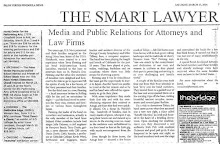Whenever you are being interviewed by a journalist you really have two distinct audiences: 1) the media outlet itself, and; 2) the public.
Audiences.
At some point in your education you likely recall having a teacher or professor lecture you on the importance of "identifying the audience" you want to communicate with.
It is a simple idea and we all are guided by a version of this advice every day. For example. You talk to your peers differently than you talk to a client or an elderly relative or a child or your doctor. You use different language for each. You stress different points. You frame your message differently.
The reason you tailor your message to your audience is not merely make sure you are understood [i.e.: your 8-year-old niece will not be able to fully appreciate the concept of an expanded liability exception to governmental immunity no matter how many times you read to her from that amazing Motion and Brief you just drafted].
Maybe the most important reason for addressing a specific audience is to create interest and empathy --you want the audience to care as well as understand.
Preliminary Audience.
The media outlet itself can be seen as a preliminary audience. The journalist and the editor are the gatekeepers to the public you want to reach. They hold the keys to the door you want to enter.
In some ways dealing with this audience is analogous to the procedural steps you must follow before presenting your facts to a jury. If you don't accomplish the preliminary process [Timely filing, establishing standing, etc] correctly you will never make it to closing arguments [or even opening arguments ...or even voir dire]
The good news is that your task relative to this preliminary audience --the media outlet itself-- is simple compared to establishing standing or undertaking Discovery.
How do you do that? You have to give the media a product they can sell.
Final Audience.
Once you have won over the media gatekeepers your final audience is the public.
Using the analogy above the public is like your jury. You want this final audience to hear your persuasive take on the facts.
You accomplish that by crafting and using a set of simple "talking points" that summarize your message in the light most advantageous to you. And you convey your talking points repeatedly and almost exclusively so they become the message that is quoted in the story.
Your reputation is your most valuable asset
Subscribe to:
Post Comments (Atom)







No comments:
Post a Comment